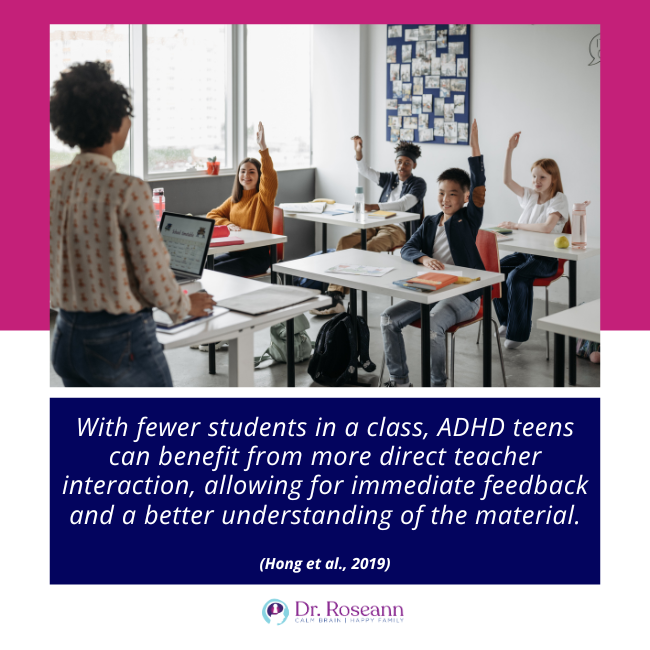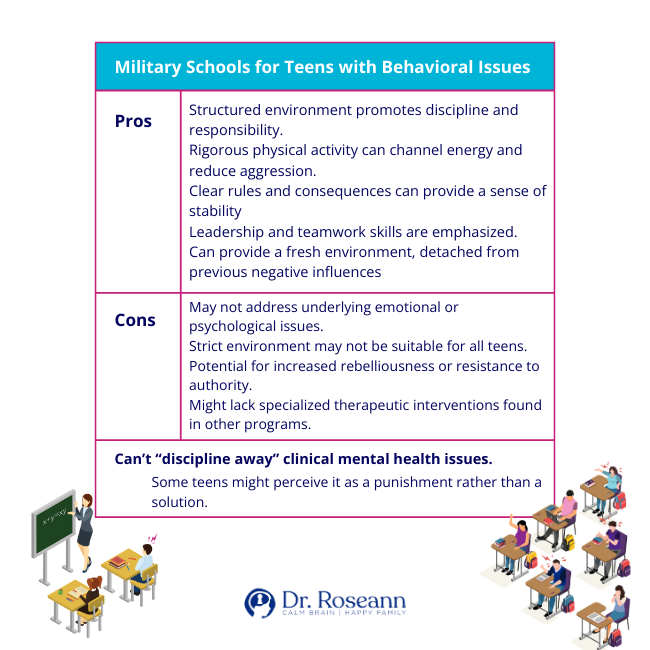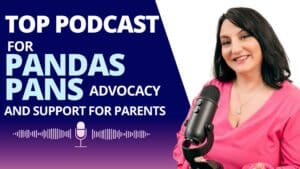Choosing The Right Boarding School for Troubled Teens: Factors to Consider
In recent years, the discussion around ADHD and other behavioral disorders has grown. The rising concern for many parents is how best to help their children and teens with behavioral and mental health challenges. While medications are a common solution, there is a growing belief that supporting behaviors is more beneficial in the long run. One such method of support is therapeutic schools for kids with behavioral issues and/or ADHD.
Difference Between “Bad Behavior” and Clinical Mental Health Issues
First, it’s important to differentiate between general “bad behavior” and genuine clinical mental health issues. “Bad behavior” might be occasional temper tantrums or challenging authority, a phase that many kids go through.
Clinical mental health issues, however, are deeper rooted and may include disorders like ADHD, depression, anxiety, and more (Hong et al., 2019). When a teen's behavior is driven by such clinical conditions, they require specialized care and attention, which goes beyond regular disciplining.
Types of Emotional Behavioral Issues That Schools for Troubled Teens May Address
Schools for troubled teens primarily cater to those with emotional and behavioral challenges. They address a range of issues including:
- ADHD
- Depression
- Anxiety disorders
- Oppositional Defiant Disorder (ODD)
- Conduct disorders
- Substance abuse issues
How a Therapeutic School Can Help a Teen with ADHD
For teens with ADHD, navigating a traditional educational environment can often present challenges. They might struggle with focusing, impulsivity, or hyperactivity – behaviors that, in mainstream settings, can sometimes lead to misunderstandings or mislabeling. A therapeutic school, however, offers a sanctuary of understanding, equipped with the tools and expertise to guide ADHD teens towards academic and personal success.
Pros of a Therapeutic School for ADHD Teens:
- Structured Environment: The consistent routines and clear expectations in therapeutic schools can help teens with ADHD develop essential organizational skills and reduce feelings of overwhelm.
- Customized Learning Plans: Recognizing that every teen with ADHD has unique strengths and challenges, these schools often develop individualized education plans (IEPs). This ensures that learning is tailored to their specific needs, boosting their chances of academic achievement.
- Smaller Class Sizes: With fewer students in a class, ADHD teens can benefit from more direct teacher interaction, allowing for immediate feedback and a better understanding of the material (Hong et al., 2019).

- Specialized Teaching Strategies: Instructors in therapeutic schools typically have years of experience or training in teaching strategies beneficial for ADHD students. This can include techniques to improve focus, organization, and task completion.
- Regular Counseling and Therapy: Beyond just academic support, therapeutic schools integrate regular counseling sessions. This can address any coexisting emotional or behavioral issues and help teens develop strategies to manage their ADHD symptoms.
- Group Therapy: As highlighted, group therapy sessions in these institutions provide a safe environment for teens to discuss their challenges and triumphs, promoting mutual understanding and shared coping techniques. Interacting with peers facing similar issues can be immensely reassuring, allowing students to recognize they're not alone in their struggles (Arias-Pujol & Anguera, 2017).
Cons of a Therapeutic School for ADHD Teens:
- Cost: Therapeutic schools, given their specialized services, can sometimes be more expensive than traditional educational institutions, potentially straining family finances.
- Perception: Some teens might feel isolated or stigmatized for attending a “special” school, which can affect their self-esteem.
- Intensity: The focused intensive environment, while beneficial, might also feel overwhelming for some teens, especially if they're not used to such structured settings.
- Distance from Home: Many of the best therapeutic schools for troubled youth near me might not always be “near me.” Depending on the location, some families might have to consider boarding options, which can be emotionally challenging.
- Adjustment Period: Transitioning to a new school, especially one with a different approach, can require an adjustment period. Some teens might initially resist the change, requiring additional support during the transition.
For teens with ADHD, therapeutic schools can be transformative. By addressing both educational and emotional needs, they provide a holistic approach to help students thrive. Parents seeking to support their teenage boy or girl should weigh the pros and cons for both your child and family.
Types of School for Troubled Teens
Navigating the landscape of educational options for troubled teens can be overwhelming for parents. It's crucial to understand the different types of schools available to make an informed choice tailored to your child's needs. In this section, we'll explore the various schools designed to assist teens facing behavioral and emotional challenges.
Boarding Schools for Troubled Teens
These are long-term facilities that combine academic instruction with therapeutic care. They are particularly beneficial for troubled boys and girls who need a fresh start away from their current environment.
Therapeutic Boarding Schools
Focused more on therapy, these schools provide academic instruction alongside intensive therapeutic interventions. They have years of experience handling teens with severe behavioral and emotional challenges (Das et al., 2016).
Residential Programs
These are primarily therapeutic and may or may not offer academic instruction. Teens live on-site and receive round-the-clock care. They are suitable for youths with serious emotional, behavioral issues or drug abuse problems.
Wilderness Programs
These programs use nature as a therapeutic tool. Teens engage in outdoor activities which are both challenging and therapeutic. They often help in building resilience and self-esteem (Johnson et al., 2020).
Schools for ADHD Teens
Specifically catering to teens with ADHD, these schools focus on providing an environment where these students can gain academic skills while also addressing their ADHD symptoms. These skills may also address poor executive functioning or a lack of social skills.
Substance Abuse Programs
For teens grappling with substance abuse, these programs offer specialized care, including detox, counseling, and therapy. Some programs may be partial day programs or residential.
Military School
While traditionally seen as a strict discipline-focused option, many military schools now incorporate therapeutic elements to help troubled youths.

Choosing The Right Boarding School for Troubled Teens: Factors to Consider
When seeking a school for a teenage boy or girl, consider:
- Safety: Ensure a safe environment for your child.
- Safety Protocols: Investigate the school’s procedures for emergencies, its security measures, and how it addresses risky behaviors among students.
- Experience: Schools with years of experience usually have refined their approaches.
- Therapeutic Methods: Look into the types of therapy they offer, including more holistic ways to support behavior.
- Staff Qualification: Every staff member should be adequately trained.
- Peer Environment: Consider the type of troubled teens the school caters to.
- Program Accreditation: Ensure that the school or program is accredited by relevant educational and therapeutic organizations. This guarantees a certain standard of education and care.
- Individualized Care: Check if the school offers individualized care plans. Each teen is unique, and their care plan should reflect their specific needs.
- Aftercare Programs: Some teens require continued support even after they leave the school. Programs that offer aftercare or alumni services can help in ensuring long-term success.
- Family Involvement: Therapeutic success often involves family dynamics. Schools that involve families in therapy or provide resources for parents can be more effective.
- Cost and Financial Aid: While it shouldn’t be the primary deciding factor, the cost is a practical concern for many families. Look for schools that offer financial aid or payment plans.
- Location: Depending on the teen's needs, you might prefer a school close to home for easier visits or one further away to provide a completely fresh environment.
- Size of the School: Some students may benefit from a smaller, more intimate setting, while others might thrive in larger environments.
- Cultural and Recreational Activities: These can play a significant role in a teen’s rehabilitation. Activities like art, music, sports, and even vocational training can provide therapeutic benefits.
- Duration of Program: While some programs might be short-term interventions, others may last several months or even years. Consider what duration is best for your teen's needs.
- Reviews and Testimonials: Hearing from other parents and former students can give you insights into the school's effectiveness and environment.
- Therapeutic Modalities: It's crucial to understand the types of therapies offered. Whether it's Cognitive Behavioral Therapy (CBT), Dialectical Behavior Therapy (DBT), equine therapy, or others, ensure they align with your child's needs, especially modalities that forster coping skills.
- Academic Rigor: While therapy is crucial, education shouldn't take a backseat. Ensure that the school provides a rigorous academic program so your child doesn't fall behind in their studies.
- Facilities: Basic facilities like living quarters, classrooms, recreational areas, and therapy rooms should be conducive to learning and healing.
While medications may offer relief, they also come with many dangerous side effects. That is why it's imperative to address the root cause of behavioral issues. “Checking under the hood” with a QEEG Brain Map is the first step for those that participate in our BrainBehaviorReset™ Program. Behaviors can feel so “out of control” when you don’t have the right solution and that is what we do in our program: we use science-backed solutions, such as supplements, neurofeedback and PEMF, that calm the brain and address behaviors.
Citations:
Arias-Pujol, E., & Anguera, M. T. (2017). Observation of Interactions in Adolescent Group Therapy: A Mixed Methods Study. Frontiers in psychology, 8, 1188. https://doi.org/10.3389/fpsyg.2017.01188
Das, J. K., Salam, R. A., Lassi, Z. S., Khan, M. N., Mahmood, W., Patel, V., & Bhutta, Z. A. (2016). Interventions for Adolescent Mental Health: An Overview of Systematic Reviews. The Journal of adolescent health : official publication of the Society for Adolescent Medicine, 59(4S), S49–S60. https://doi.org/10.1016/j.jadohealth.2016.06.020
Gargano, L. M., Locke, S., Li, J., & Farfel, M. R. (2018). Behavior problems in adolescence and subsequent mental health in early adulthood: results from the World Trade Center Health Registry Cohort. Pediatric research, 84(2), 205–209. https://doi.org/10.1038/s41390-018-0050-8
Hong, J. S., Tillman, R., & Luby, J. L. (2015). Disruptive behavior in preschool children: distinguishing normal misbehavior from markers of current and later childhood conduct disorder. The Journal of pediatrics, 166(3), 723–30.e1. https://doi.org/10.1016/j.jpeds.2014.11.041
Johnson, E. G., Davis, E. B., Johnson, J., Pressley, J. D., Sawyer, S., & Spinazzola, J. (2020). The effectiveness of trauma-informed wilderness therapy with adolescents: A pilot study. Psychological trauma : theory, research, practice and policy, 12(8), 878–887. https://doi.org/10.1037/tra0000595
Are you looking for SOLUTIONS for your struggling child or teen?
Dr. Roseann and her team are all about science-backed solutions, so you are in the right place!
Grab your complimentary copy of
147 Therapist-Endorsed Self-Regulation Strategies for Children: A Practical Guide for Parents
You can get her books for parents and professionals, including: It’s Gonna Be OK™: Proven Ways to Improve Your Child’s Mental Health, Teletherapy Toolkit™ and Brain Under Attack: A Resource For Parents and Caregivers of Children With PANS, PANDAS, and Autoimmune Encephalopathy.
If you are a business or organization that needs proactive guidance to support employee mental health or an organization looking for a brand representative, check out Dr. Roseann’s professional speaking page to see how we can work together.
Dr. Roseann is a Children’s Mental Health Expert and Therapist who has been featured in/on hundreds of media outlets including, CBS, NBC, FOX News, PIX11 NYC, The New York Times, The Washington Post, Business Insider, USA Today, CNET, Marth Stewart, and PARENTS. FORBES called her, “A thought leader in children’s mental health.”

She is the founder and director of The Global Institute of Children’s Mental Health and Dr. Roseann Capanna-Hodge, LLC. Dr. Roseann is a Board Certified Neurofeedback (BCN) Practitioner, a Board Member of the Northeast Region Biofeedback Society (NRBS), Certified Integrative Mental Health Professional (CIMHP) and an Amen Clinic Certified Brain Health Coach. She is also a member of The International Lyme Disease and Associated Disease Society (ILADS), The American Psychological Association (APA), Anxiety and Depression Association of America (ADAA) National Association of School Psychologists (NASP), International OCD Foundation (IOCDF) International Society for Neurofeedback and Research (ISNR) and The Association of Applied Psychophysiology and Biofeedback (AAPB).
© Roseann-Capanna-Hodge, LLC 2023










